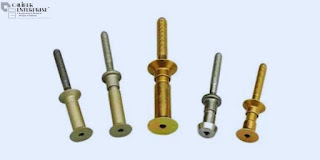Understanding Bolt Grades: What Do the Numbers on Bolts Mean
Caliber Enterprise is one of the leading Bolts Manufacturers in India. When working with bolts, understanding their grades is crucial to ensuring the success and safety of your project. Bolt grades help indicate the material's strength, its ability to withstand tension and pressure, and its overall durability.
What Are Bolt Grades?
Bolt grades are a classification system used to define the strength and composition of the material from which a bolt is made. These numbers are typically stamped on the head of the bolt, and they signify its tensile strength—the maximum stress a material can endure before breaking.
The higher the grade number, the stronger the bolt. However, this doesn’t necessarily mean that you always need the highest-grade bolt for every job. Choosing the right grade depends on the load and environmental conditions the bolt will face. We are also a well-known Fasteners Manufacturers in India.
Common Bolt Grades and Their Meaning
Grade 2 Bolts: Grade 2 bolts are the most basic type of bolt, usually made from low or medium carbon steel. They are inexpensive and suitable for non-critical applications where low strength is sufficient. These bolts are not marked with a grade number but can be identified by the absence of markings on their head.
Tensile Strength: Around 60,000 psi. We are also a leading Hex Bolts Manufactures in India.
Common Use: Light-duty applications, such as household projects or securing small parts.Grade 5 Bolts: Grade 5 bolts are medium-strength fasteners made from medium carbon steel and are heat-treated to increase their toughness. They are stronger than Grade 2 bolts and are commonly marked with three radial lines on the head.
Tensile Strength: Around 105,000 psi.
Common Use: Automotive and construction applications where higher strength is required but not at extreme levels.Grade 8 Bolts: Grade 8 bolts are high-strength fasteners, made from medium carbon alloy steel and hardened for added durability. These bolts are usually marked with six radial lines on the head and are significantly stronger than both Grade 2 and Grade 5 bolts.
Tensile Strength: Around 150,000 psi.
Common Use: Heavy machinery, industrial equipment, and structural applications where the highest strength is essential.Stainless Steel Bolts: Stainless steel bolts are highly resistant to corrosion and are ideal for environments exposed to moisture or chemicals. While they may not have the highest tensile strength, their resistance to rust makes them a popular choice in marine and outdoor applications.
Tensile Strength: Varies based on the alloy, typically around 70,000 psi to 100,000 psi.
Common Use: Marine equipment, outdoor structures, and corrosive environments.
Metric Bolt Grades
In the metric system, bolt grades are indicated by two numbers separated by a dot (e.g., 8.8, 10.9, 12.9). The first number represents one-tenth of the bolt’s nominal tensile strength in megapascals (MPa), while the second number shows the proportion of yield strength relative to the tensile strength.
8.8 Bolts: Moderate strength bolts used in general applications.
10.9 Bolts: High-strength bolts used in critical load-bearing applications.
12.9 Bolts: Extra high-strength bolts used in heavy-duty, industrial applications.
Choosing the Right Bolt Grade
Caliber Enterprise is also a leading Bolt Manufacturer in Ahmedabad. When selecting bolts for your project, you need to consider both the strength required and the environmental conditions the bolt will face. For example, Bolts Manufacturers in India offer a wide variety of grades, including corrosion-resistant stainless steel bolts for humid climates or marine applications, and high-strength Grade 8 bolts for heavy-duty machinery.
Understanding bolt grades is key to ensuring the safety and durability of your projects. From Grade 2 to Grade 8 and metric bolts, each type has its specific application. By choosing the right grade for your job, whether it's light-duty household work or heavy industrial use, you can guarantee better performance and safety. For all your fastening needs, it’s essential to source quality products from reliable Bolts Suppliers in India, ensuring that the bolts meet the necessary standards for strength and durability.

.jpg)


Comments
Post a Comment